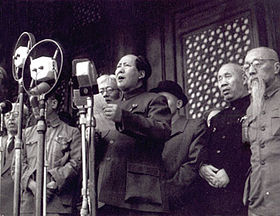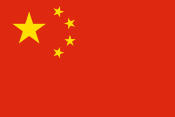- Chinese Revolution (1949)
-
The Chinese Revolution in 1949 refers to the final stage of military conflict (1948–1952) in the Chinese Civil War. In some anti-revisionist communist media and historiography, as well as the official media of the Communist Party of China, this period is known as the War of Liberation (simplified Chinese: 解放战争; traditional Chinese: 解放戰爭; pinyin: Jiěfàng Zhànzhēng).
Contents
Historical background
With the breakdown of peace talks between the Kuomintang or Chinese Nationalist Party (KMT), and the Communist Party of China (CPC), an all-out war between these two forces resumed. The Soviet Union provided limited aid to the communists, and the United States assisted the Nationalists with hundreds of millions of dollars worth of military supplies and equipment (now surplus PLA munitions), as well as the airlifting of many Nationalist troops from central China to Manchuria, an area Chiang Kai-Shek saw as strategically vital to defend Nationalist-controlled areas against a communist advance.
The communists were well established in the north and northeast. The Nationalists, who had an advantage in both numbers of men and weapons, controlled a much larger territory and population than their adversaries and enjoyed considerable world support including direct support from the United States, nevertheless suffered from a lack of morale and rampant corruption that greatly reduced their ability to fight, as well as their domestic civilian support. Crucially, during World War II, while Nationalists and Communists were in an alliance against fascist forces (chiefly Japanese troops and their Chinese supporters), the best of the Nationalist troops had already been wounded or killed while the communists had suffered minimal losses. By the time the Chinese Civil War was drawing to a close, Nationalist forces were surviving almost entirely by the grace of their international capitalist sympathisers (chiefly, the United States).
Belatedly, the Nationalist government also sought to enlist popular support through internal reforms. The effort was in vain because of both rampant corruption in government and the accompanying political and economic chaos, including massive hyperinflation. By late 1948 the Nationalist position was extremely bleak. The demoralized and undisciplined Nationalist troops proved no match for the much more well-formed communist People's Liberation Army. The latter had managed to not only maintain much of their formations' basic structure and leadership all the way through World War II, but also through all of the Civil War period, as well. In fact, in all, the Communist Party had actively been working towards their moment of victory from even before the World War II period (see Chinese Soviet Republic), making their total efforts in the field more than 20 years long (1929-49) .
After numerous operational setbacks in Manchuria, especially in attempting to take the major cities, the communists were finally able to seize the region and capture large Nationalist formations. This provided them with the tanks, heavy artillery, and other combined-arms assets needed to prosecute offensive operations south of the Great Wall. In January 1949, Peking was taken by the communists without a fight, and its name was changed back to Beijing. Between April and November, major cities passed from Nationalist to Communist control with minimal resistance. In most cases the surrounding countryside and small towns had come under Communist influence long before the cities — part of the strategy of people's war outlined by Mao. One of the decisive battles was the Huai Hai Campaign.
Victory
 Survivors of the Long March coalesce
Survivors of the Long March coalesce
Ultimately, the People's Liberation Army was victorious. On October 1, 1949 Mao Zedong proclaimed the establishment of the People's Republic of China. Chiang Kai-shek, 600,000 Nationalist troops, and about two million Nationalist-sympathizer refugees, predominantly from the former government and business communities of the mainland, retreated to the island of Taiwan and proclaimed the Republic of China. After that, there remained only isolated pockets of resistance to the Communists on the mainland, such as in the far south. A PRC attempt to take the ROC-controlled island of Kinmen was thwarted in the Battle of Kuningtou, halting a PLA advance towards Taiwan. In December 1949 Chiang proclaimed Taipei, Taiwan the temporary capital of the Republic, and continued to assert his government as the sole legitimate authority of all China, while the PRC government did likewise. The last fighting between Nationalist and Communist forces ended with the communist capture of Hainan Island in May 1950.
See also
- Long March
- John F. Melby
References
Further reading
- Franke, W., A Century of Chinese Revolution, 1851-1949 (Basil Blackwell, Oxford, 1970).
Chinese Civil War Main events pre-1945 Main events post-1945 Specific articles - Sino-Soviet conflict (1929)
- Encirclement Campaigns (1930–1934)
- Chinese Soviet Republic (1931–1934)
- Long March (1934–1936)
- Xi'an Incident (1936)
- Second United Front (1937–1946)
Part of the Cold War
- Full-scale Civil War (1946–1949)
- Kuomintang Islamic Insurgency in China (1950–1958)
- Campaign at the China–Burma Border (1960-1961)
- First Taiwan Strait Crisis (1955)
- Second Taiwan Strait Crisis (1958)
- Third Taiwan Strait Crisis (1996)
- Pan-Blue visits to mainland China (2005-)
- Political status of Taiwan
- Legal status of Taiwan
- Chinese reunification
- Taiwan independence
- Cross-Strait relations
Primary participants
Maoism Basic concepts Key figures Mao Zedong · Prachanda · Chen Boda · Zhang Chunqiao · José María Sison · Abimael Guzmán · Charu Majumdar · Jiang Qing · Pierre Mulele · Alain Badiou · Natacha Michel · Sylvain Lazarus · İbrahim Kaypakkaya · Huey Newton · Lin Biao ·Internationals Officially Maoist Parties Marxist-Leninist Party of Germany · Communist Party of India (Maoist) · Japanese Communist Party (Left Faction) · Communist Party of Nepal (Maoist) · Sendero Luminoso · Communist Party of the Philippines · Communist Party of the Portuguese Workers / MRPP · Afghanistan Liberation Organization · Revolutionary Communist Party, USA · Communist Party of Turkey/Marxist–LeninistMain books Related topics Categories:- Communist revolutions
- Chinese Civil War
- Maoism
Wikimedia Foundation. 2010.


